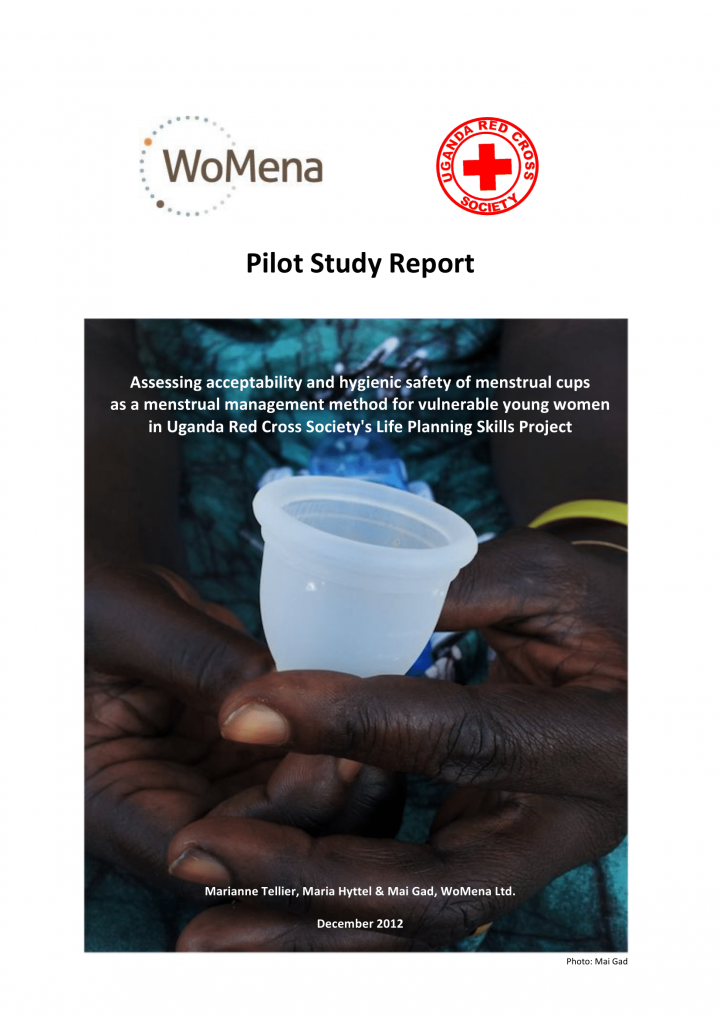Pilot Study Report: Assessing acceptability and hygienic safety of menstrual cups as a menstrual management method for vulnerable young women in Uganda Red Cross Society's Life Planning Skills Project
Tellier, M., Hyttel, M., Gad, M. (2012)

Published in: 2012
Pages: 10
Publisher:
WoMena
Author:
Tellier, M., Hyttel, M., Gad, M.
Uploaded by:
Marianne Tellier
Partner profile:
WoMena
2896 Views
97 Downloads
Location of library entry
Study objectives: The objectives of this study were to assess young girls and women’s acceptability, suitability and hygienic safety of using menstrual cups in Uganda, when introducing cups through the Uganda Red Cross Society (URCS) Life Planning Skills (LPS) project framework. In the long-‐term, this is intended to support the formulation and implementation of policies and programs aimed at introducing acceptable, suitable and safe methods for menstrual management, thus strengthening reproductive rights and services for girls and women in Uganda.
Methods: 31 study participants (female “Life Planning Skills” beneficiaries as well as Uganda Red Cross Society volunteers and staff from URCS Kitgum) were given a menstrual cup and trained in its correct use and cleaning. At baseline and follow‐up (after 3-5 months) gynecological check ups, a structured questionnaire survey, semi structured interviews and focus group discussions were conducted.
Results and discussion: The overall experience of trying the menstrual cup was for all participants either very good (75%, n=18) or good (25%, n=6). Some had found it a bit difficult to insert/remove the menstrual cup in the beginning, but all participants had found it comfortable after a few times. Participants reported that cup use make them "free" to do what they normally do when they are not in their period, e.g. walking, biking and attending social gatherings. More specifically, when using a menstrual cup they did not have to worry about embarrassment related to leakage and stains on clothes as with cotton wool and cloth methods. Menstrual cups were more comfortable than pads/cotton cloths, which may cause skin irritation. In addition, cup use lead to time and money savings as cups needed less changing, took less time and resources to clean, and less money had to be spent on soap and/or disposable pads/cotton wool. Altogether, cup use lead to increased physical, mental and social comfort. Friends, relatives and partners were supportive and participant stories indicated a high interest in menstrual cups among girls and women in general. The gynecological checks indicate that menstrual cup use neither caused reproductive tract infections nor increased the risk of urinary tract infections among study participants. The test results and the descriptions of cleaning practices from the interviews indicate that they have understood and have been practicing the most important procedures related to hygienic safety when using and cleaning their menstrual cup.
Conclusion: The menstrual cup appears to be highly acceptable, practical and hygienically safe to use and can contribute to improve the quality of life for girls and women in similar settings. In addition, money saved can be used for e.g. soap for improved menstrual hygiene. This pilot study seems to have reached its objectives of empowering vulnerable women and young girls through improved menstrual management.
Recommendations: Menstrual cups should be made available and affordable for vulnerable young girls and women in Uganda. The Life Planning Skills project model and the training curriculum developed on menstrual cup hygiene and use for this pilot study can serve as example and inspiration for incorporating menstrual cups into LPS projects in other URCS branches as well as into other similar projects on reproductive health.
Bibliographic information
Tellier, M., Hyttel, M., Gad, M. (2012). Pilot Study Report: Assessing acceptability and hygienic safety of menstrual cups as a menstrual management method for vulnerable young women in Uganda Red Cross Society's Life Planning Skills Project. WoMena
Filter tags
Case studies in other formats English Gender transformative WASH Menstrual Health and Hygiene (MHH) Sub-Saharan Africa Women's rights & representation and empowerment















